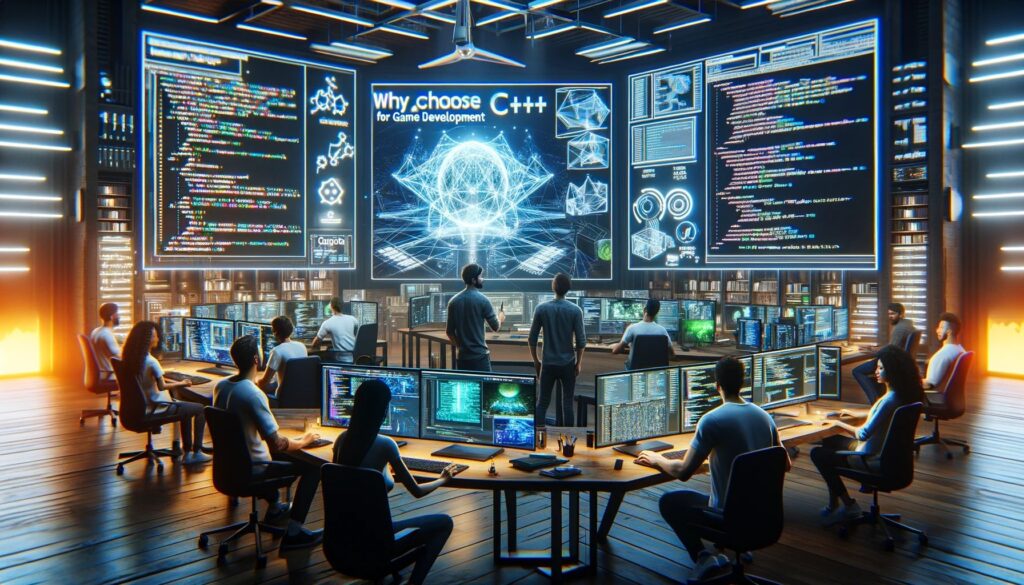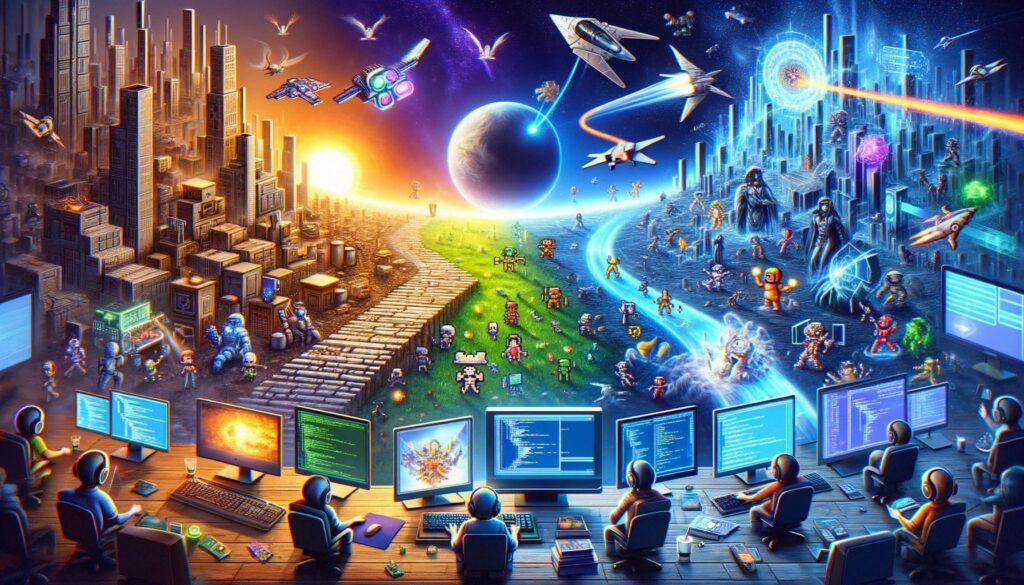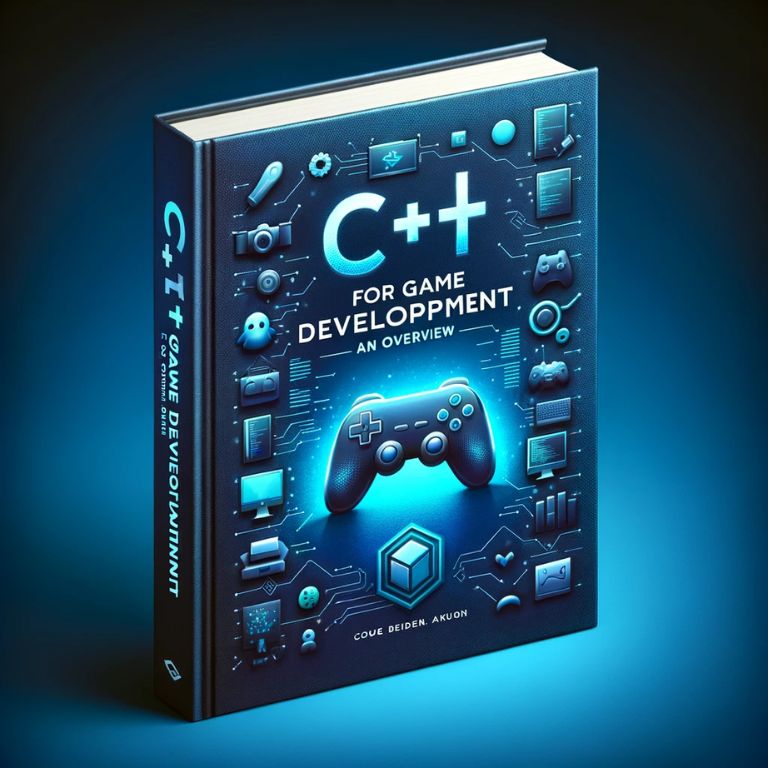Introduction to C++ in Game Development
C++ stands as a cornerstone in game development, renowned for its efficiency, power, and adaptability. Developed as an extension of the C language, it has evolved to include features like the Standard Template Library (STL) and object-oriented capabilities, enhancing its suitability for complex and performance-intensive applications like video games. Its ability to interact directly with hardware and memory makes it indispensable for creating high-speed, real-time gaming experiences.
The adoption of C++ in the gaming industry is widespread, evident in its use in leading game engines such as Unreal Engine and Unity 3D. These engines exploit C++’s capabilities for rendering detailed graphics, managing game physics, and handling intensive data processing, maintaining high performance throughout. Despite its steep learning curve, C++ remains a rewarding language to master, opening significant opportunities in game development and beyond. As the industry evolves, C++ continues to be a critical tool in driving innovation and creativity in gaming.
Why Choose C++ for Game Development

The choice of C++ for game development is influenced by a combination of its technical capabilities and its established presence in the gaming industry. This section will explore the reasons why C++ is often the preferred programming language for game developers.
Unparalleled Performance and Efficiency
C++ is lauded for its exceptional performance, a critical requirement in game development. The language’s ability to provide low-level access to memory and system resources allows developers to optimize their games for speed and responsiveness. This feature is particularly important in high-intensity games where every millisecond counts in delivering a seamless user experience.
Flexibility and Control
One of C++’s greatest strengths is its flexibility. It supports various programming paradigms, including procedural, object-oriented, and generic programming. This versatility allows game developers to choose the most effective approach for their specific game mechanics and design goals. Furthermore, C++ offers granular control over system resources and hardware, enabling developers to fine-tune their games for maximum performance and efficiency.
Robust Standard Library and Tooling
C++ comes equipped with a robust Standard Template Library (STL), which provides a wealth of pre-written classes and functions for common programming tasks. This library significantly reduces development time and increases productivity by offering ready-to-use solutions for complex algorithms, data structures, and arithmetic operations. Additionally, C++ is supported by a wide array of development tools, including powerful integrated development environments (IDEs) and debugging tools, which streamline the development process.
Industry Adoption and Ecosystem
The gaming industry’s embrace of C++ has created a rich ecosystem around the language. Many of the top game engines, such as Unreal Engine and Unity 3D, are built using C++ and offer extensive libraries and tools specifically tailored for C++ developers. This widespread adoption has also fostered a large community of C++ developers, providing ample resources, forums, and collaborative opportunities for both novice and experienced game developers.
C++ Features and Their Benefits in Game Development
| Feature | Benefit in Game Development |
|---|---|
| Low-level memory access | Enables optimal performance and resource management |
| Object-oriented programming | Facilitates organized and modular code development |
| Standard Template Library (STL) | Provides ready-to-use, efficient data structures and algorithms |
| Multi-paradigm support | Allows flexibility in programming approaches |
| Comprehensive tooling and IDE support | Streamlines development and debugging processes |
C++ stands out as the language of choice for game development due to its performance, control, flexibility, and comprehensive ecosystem. Its features align well with the demands of modern game development, making it an indispensable tool for developers aiming to create high-quality, efficient, and engaging games.
C++ and Game Engines: Powering the Giants
C++ is a key player in the architecture of major game engines, known for its efficiency and versatility. Engines like Unreal Engine, Unity 3D, and CryEngine rely on C++ for core functionalities, enhancing their capabilities in rendering, physics simulations, and overall game performance.
- Unreal Engine: Utilizes C++ for its high-fidelity graphics and real-time rendering. Developers can access and modify its C++ source code, optimizing the engine for specific game requirements.
- Unity 3D: While known for C# scripting, its core engine is built on C++. This ensures high performance, particularly for complex games.
- CryEngine: Employs C++ for its realistic environments and advanced physics, showcasing C++’s ability to handle intensive computational demands.
C++’s integration into these game engines underscores its critical role in modern game development. Its use in these engines guarantees that they remain capable of producing top-tier games with advanced features.
Multithreading and Parallelism in C++
In the realm of game development, performance optimization is crucial, and this is where C++ shines with its support for multithreading and parallelism. These features allow game developers to harness the full potential of modern multi-core processors, leading to faster and more efficient game performance.
Understanding Multithreading in C++
Multithreading in C++ enables a program to run multiple threads concurrently. This is particularly beneficial in games, where different aspects such as AI, physics simulations, and graphics rendering can run in parallel, significantly boosting game performance. By dividing these tasks across multiple threads, C++ ensures that each core of the processor is utilized effectively, reducing bottlenecks and enhancing the gaming experience.
Parallelism for Enhanced Performance
Parallelism in C++ takes the concept of multithreading further by allowing the simultaneous execution of operations. This is especially useful in games where certain tasks, like particle system updates or collision detection, can be executed in parallel. C++ provides various tools and libraries, such as OpenMP and Intel Threading Building Blocks, to facilitate parallel programming, enabling developers to write code that is both efficient and scalable.
Real-World Applications in Games
In practice, multithreading and parallelism in C++ have transformed the way games are developed and experienced. For instance, in a complex game environment, AI calculations can be processed in one thread, while another handles the physics, and a third manages user inputs and game logic. This division not only speeds up the game processing but also ensures smoother gameplay.
Benefits of Multithreading and Parallelism in Game Development
| Aspect | Benefit |
|---|---|
| Performance | Enhanced processing speed and efficiency |
| Responsiveness | Improved player experience with smoother gameplay |
| Resource Utilization | Optimal use of multi-core processors |
| Scalability | Ability to handle complex, resource-intensive tasks |
The implementation of multithreading and parallelism in C++ is a game-changer in the development of modern video games. It allows developers to optimize the performance of their games, making full use of the processing power available.
Data Structures and Algorithms in C++ Game Development

Efficient data structures and algorithms are fundamental in C++ game development, crucial for enhancing performance in areas like collision detection and pathfinding.
Key Data Structures
C++ provides various data structures tailored for different gaming needs:
- Arrays and Vectors: Used for fast access to game entities.
- Trees and Graphs: Ideal for representing hierarchical game models and network-based games.
- Stacks and Queues: Helpful for game logic and AI decision-making.
Essential Algorithms
Algorithms in C++ optimize game mechanics and physics:
- *Pathfinding Algorithms (A, Dijkstra’s)**: Crucial for AI navigation.
- Collision Detection Algorithms: Determine interactions between objects.
- Graph Algorithms: Model and traverse game maps.
Impact on Game Performance
The right data structures and algorithms enhance memory management and processing speed, leading to smoother gameplay and better performance.
The use of efficient data structures and algorithms in C++ is key to handling complex computations and large data volumes in games. Their strategic implementation is critical for creating sophisticated and engaging gaming experiences.
Comparing C++ with Other Game Development Programming Languages
In game development, C++ is often compared with languages like Python, Java, C#, and C, each with its own strengths.
- C++: Excels in high-performance, real-time games due to its speed and low-level memory management.
- Python: Preferred for its simplicity and rapid development, suitable for scripting and less performance-intensive tasks.
- Java: Offers portability and ease of use, used in mobile game development, but less efficient for high-performance tasks compared to C++.
- C#: Common in Unity-based games, easier to learn than C++ but offers less control over system resources.
- C: Provides great control as a low-level language, but less convenient than C++ for complex game development.
C++ stands out in compute-intensive scenarios, crucial for real-time gaming experiences. Other languages like Python and C# are more suited for indie and mobile games due to their ease of use.
C++ remains the preferred choice for performance-critical game development, but other languages like Python and C# serve well in less resource-intensive scenarios. The choice depends on the game’s specific needs, with C++ leading in demanding environments.
The Learning Curve: Mastering C++ for Game Development
Mastering C++ for game development is a journey that involves understanding its complexities and harnessing its powerful features. This section explores the challenges and rewards of learning C++, and how it shapes a developer’s skill set.
The Complexity of C++
C++ is known for its steep learning curve, primarily due to its complexity and extensive feature set. It offers low-level memory management, a feature not present in many higher-level languages. This level of control, while powerful, can be daunting for beginners. Understanding C++’s syntax, paradigms, and best practices requires time and dedication.
Building a Strong Foundation
For beginners, starting with the basics is crucial. Learning fundamental concepts such as variables, data types, control structures, and functions lays the groundwork. Gradually moving to more advanced topics like object-oriented programming, templates, and STL helps in building a strong foundation.
Utilizing Learning Resources
The abundance of learning resources for C++ is a significant advantage. From online tutorials and forums to comprehensive textbooks and interactive platforms, there are numerous ways to learn C++. Engaging with the community through forums and open-source projects can also provide practical experience and valuable insights.
The Reward of Mastery
The effort invested in learning C++ pays off significantly. Mastery of C++ not only opens doors to game development but also to a wide range of software development roles. The language’s efficiency and versatility make it a valuable skill in the tech industry.
Learning C++ for Game Development
| Stage | Focus Areas | Resources |
|---|---|---|
| Beginner | Basics, syntax, simple programs | Online courses, tutorials |
| Intermediate | OOP, data structures, algorithms | Textbooks, coding platforms |
| Advanced | Multi-threading, optimization, STL | Open-source projects, forums |
Learning C++ is a challenging yet rewarding journey. While its complexity poses a significant challenge, particularly for beginners, the depth and control it offers make it a highly sought-after skill in game development. As developers progress from basic to advanced levels, they unlock the potential to create sophisticated and high-performance games.
Future of C++ in Game Development and Emerging Trends

C++ is well-positioned to remain a key player in the evolving landscape of game development. Its proficiency in handling the demands of emerging technologies like Virtual Reality (VR), Augmented Reality (AR), and Artificial Intelligence (AI) in gaming is notable. These technologies require high performance for real-time processing and graphics rendering, areas where C++ excels. Additionally, the integration of blockchain in gaming, particularly for secure transactions and decentralized experiences, will benefit from C++’s robustness and security features.
The language’s adaptability to advancements in hardware technology, such as new GPUs and CPUs, ensures that C++ remains relevant in game development. Continuous updates and improvements to C++ help it stay in line with modern programming needs, making it a reliable and future-proof choice for developers. As game development technologies progress, C++’s role in driving innovation and adapting to new challenges remains significant, positioning it as an enduring tool in the game developer’s toolkit.
Conclusion
C++’s role in game development is both foundational and transformative, encompassing a wide array of capabilities from handling high-performance demands in major game engines to facilitating advancements in emerging technologies like VR and AI. Its efficiency, flexibility, and power make it an indispensable tool in the gaming industry. The continuous evolution of C++, in tandem with the gaming world’s rapid technological advancements, ensures its relevance and indispensability in shaping future gaming experiences. As developers and creators push the boundaries of what’s possible in gaming, C++ stands as a steadfast ally, driving innovation and excellence in this ever-evolving field.




